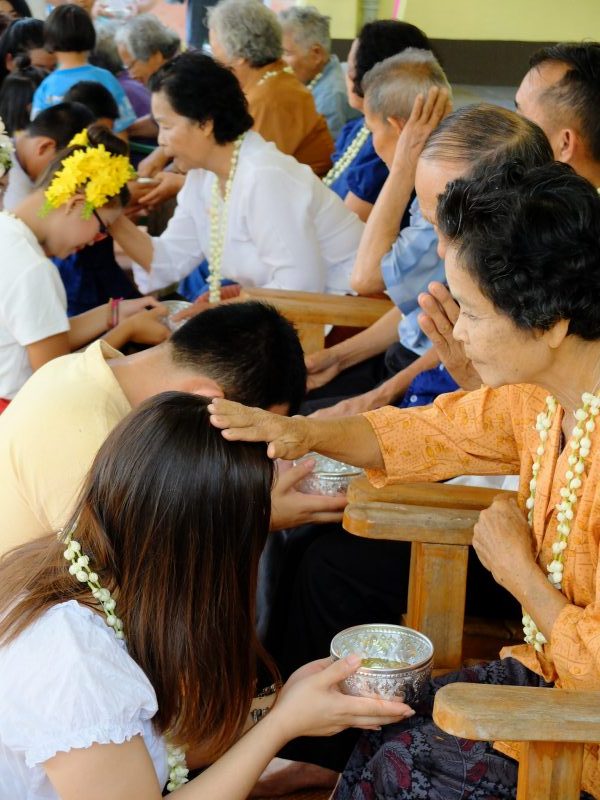One cultural difference that Westerners often have trouble understanding about Thai culture (and many other East and South Eastern cultures) is the notion of a moral debt that children owe to their parents and families. The words Westerners use, like debt or obligation, while correct, have negative connotations, and thus don’t effectively capture the essence of the concept on a fundamental level as it is experienced emotionally.
In Thai culture, this moral debt is situated within a larger context in which phuu yai (literally: Big People, referring to elders, those with more money and/or higher status) take care of phuu noi (literally: Little People, referring to those younger and with lower status). Determining who fits where is a complicated system which usually happens subconsciously and is often followed through without expressly speaking about it. Elder generations take care of younger generations, older siblings take care of younger ones–and eventually, the youth do what they can to give back. It is evidenced in ways large and small: from elders showing love by providing gifts of money for key life events and younger generations showing gratitude by bringing little bags of fruit and snacks at every visit to their elders.
As children become older, it becomes understood that one expresses love and gratitude to family by doing increasingly more to support the family. It starts with household chores and contributing to a functioning household. As children come of age and elders start to retire, it becomes a point of honor to help support one’s parents financially, as needed. As that generation starts to have their own children, they become the phuu yai–the patriarchs and matriarchs of the family. It entails not only financial responsibilities, but also responsibilities to be the moral leader of the family, facilitating important decision-making and managing family harmony.
For more individualistic cultures, this can sound complicated and onerous. In more communal cultures, it is a way to ensure everyone is taken care of, and there are positive feelings associated with it: the positive feelings of love and gratitude that prompt people to want to do nice things for their family, the positive feelings of honor that comes from noble sacrifice, and the comfort in knowing one’s place and where one belongs and knowing that, no matter what, your family will always have your back.
In the upper and growing middle socioeconomic classes, this is a system that functions remarkably well. However, for people living in poverty and in financial stress, one can see how the system contributes to burdens and builds in negative impacts. As families struggle to survive, expectations that children must contribute financially start to crop up at earlier and earlier ages. This is why there are such high dropout rates in impoverished regions–children drop out of school to find work to support their families. Without a completed degree, however, they cannot find lucrative work (except in places like the sex industry), so they are either vulnerable to exploitation, willingly sacrificing themselves so they can send money home to their families, or they are perpetually locked in extreme poverty. Often, it is both.
When a person is struggling to be able to even support themselves, it really does become a burden and a cause of stress to also be responsible for family, no matter how much one loves and wants to support their family. And that’s just in healthy families. In families where parents are abusive or neglectful due to stress, lack of understanding, or their own traumas, feelings of duty and obligation become more complex. As documented in a recent Chab Dai coalition study of survivors of sexual exploitation and trafficking in Cambodia:
“Participants supported their parents and felt responsible to provide for them, even if the relationship between them and their parents was strained or negative. This was often the case between daughters and their mothers. Some survivors expressed sadness over the loss of relationship with their mothers, but continued to do what they thought of as their duty. They expressed the desire to be close to their mothers and to gain their mothers’ approval by being good daughters, including giving them more money.” – from The Butterfly Longitudinal Research Project
Therefore, in understanding why one would “choose” to enter the sex trade, this cultural context is a key component of addressing how complex the pressures are. It’s not just financial. It is an act of love. It is an act of honor. In this context, when one loves their family, one would do anything to protect them from suffering. If participation in the sex trade is literally the only viable option, to what extent is it really a “choice”?
For this reason, as well as others, offering people other paths out of poverty and providing other options for sustainable living for individuals and their families is imperative to trafficking prevention.





